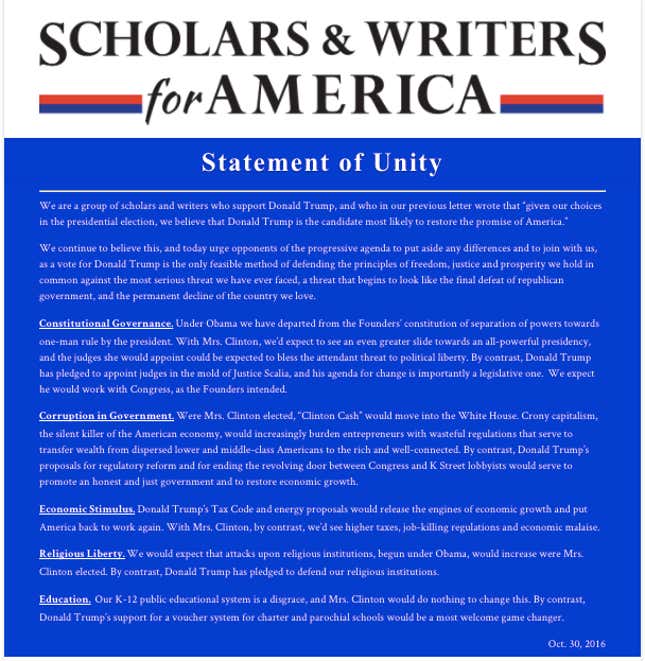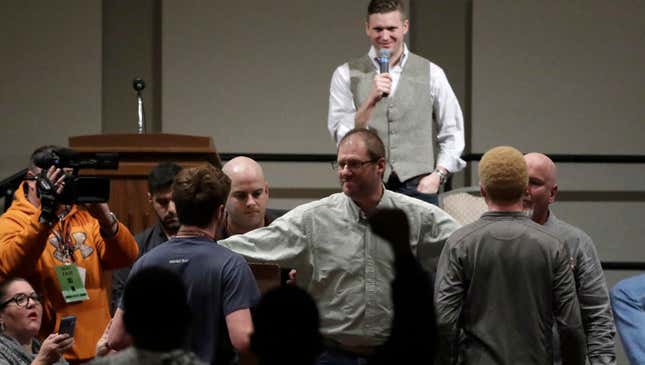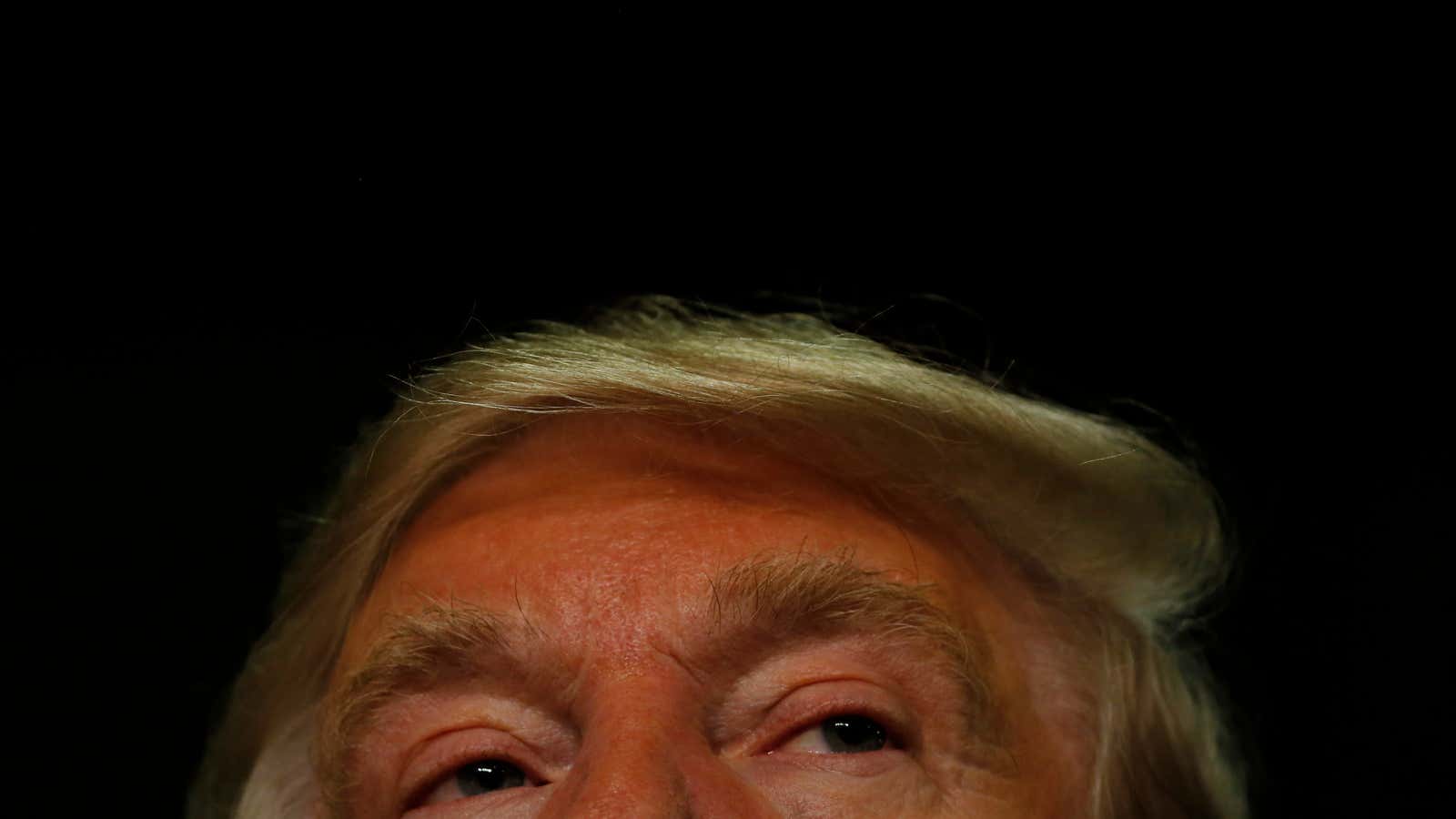When George Mason University law professor Frank Buckley started putting together a pro-Trump group of academics last year, he was hard-pressed finding colleagues willing to actually scribble their names down.
“If you want to talk about safe spaces, you might want to start talking about conservatives in the academy,” Buckley, founder of Scholars and Writers for Trump, tells Quartz. “The humanities are overwhelmingly liberal. If you want to find a Republican, chances are you’ll find him in engineering, and chances are he’ll keep his mouth shut.”

Only a few dozen professors’ names ultimately ended up on the list, out of the country’s million-strong faculty members at the college level.
Daniel Bonevac, a philosophy professor at the University of Texas at Austin, who joined Buckley’s group, recounts a certain fear among peers: “For every person who agreed to go public, there were three or four who said ‘I can’t do that,'” he says. “There was a great deal of reluctance. So many people thought they had something to lose professionally.”
At the US’s predominantly liberal colleges—long criticized by the right for being coddling and intellectually stagnant, beacons of ideals such as “safe spaces” and “trigger warnings”—everything has changed with Donald Trump’s election to the US presidency. Since Nov. 8, professors at several schools, regardless of their personal political leanings, have told Quartz of a loosening of tensions amongst faculty, a newfound willingness to speak up and voice opinions previously quashed down.
Darren Beattie, a political science professor at Duke, was one of the only non-tenured, full-time faculty members in the US to put his name on Buckley’s list and publicly come out as a Trump supporter. “And I’m still alive,” Beattie says drily. “I think people who have more controversial viewpoints should realize: it’s not going to kill you to be a little brave.”
Perhaps more than anything, Trump’s presidency presents an all-important intellectual challenge to staunchly liberal professors, who are now forced to confront policies, opinions, and statements they wildly disagree with from the president-elect’s administration. That’s already what they advocate in theory—researchers argue that diversity of political opinion leads to better policy-making and diverse environments at large can make people smarter—but less commonly in practice, in lecture halls.
“He’s helped to break the taboo on certain ways of speaking,” Bonevac says of the president-elect. “He clearly has very little tolerance for political correctness. And that’s an encouraging thing.”
The new meaning of “safety”
In an infamous September 2015 cover story, The Atlantic observed: “Something strange is happening at America’s colleges and universities.” Two years ago, there was a single, peculiarly potent word that colleges across the US abruptly all became stuck on—lingering in the air, plaguing classrooms and hallways and auditoriums: “safe.”
Safety from what? From offense, from social aggression. From people like Milo Yiannopoulos, a controversy-ridden Breitbart journalist and alt-right leader who recently landed a book deal. Yiannopoulos spent the last year delivering talks at universities in a venture he dubs the “Dangerous Faggot Tour”—with many of the talks interrupted or banned in some way. In May, white nationalist and alt-right leader Richard Spencer helped set up a contrarian “safe space” at the University of California-Berkeley, to discuss “how race affects people of European heritage.”
Post-Trump, Yiannopoulos and Spencer’s talks—and ones inspired by them—are likely to ramp up, at least in attention if not in number. Texas A&M hosted Spencer last month; Harvard invited Trump administration icon Steve Bannon to speak at its business school.

Bannon’s talk ended up being canceled at the last minute, and Spencer’s appearance drew raging protests. Yet both events, and the outrage given to them, reveal a newfound alertness on university campuses—a realization on liberal students’ and professors’ behalf that there exists an alternative political perspective with a hefty enough audience to topple a national election.
Trump’s emergence as the victor of the election unleashed a build-up of tension in America with which college campuses particularly are struggling to cope. That transformation is stunning to behold. But it also means the floodgates have been blown wide open. Colleges need not concern themselves any longer with social and intellectual tiptoeing, under a president whose modus operandi is to deny the existence of the concept altogether.
To some—it’s about time.
“I think the snowflakes need to be shaken up a bit,” says Buckley, using a term favored by conservatives to describe young people concerned with political correctness (see: the standalone Wikipedia entry “Generation Snowflake“). “At some point they’ll realize they were victims of a generational betrayal,” he says. “Fifty years back, most professors were also liberals, but the difference was that they were committed to their disciplines, and not politics.”
The controversy over “safe”—its definition, its place, its appropriateness—that overtook US colleges has been put on hold. Post-US election, gone are the op-eds from professors and students about whether it’s all right for people to adopt other cultures for Halloween costumes or whether classic literature should come with trigger warnings. They’ve been halted for the present moment. Placed on mute. The old concerns been replaced by a different set of headlines over campus safety—this time, of the physical, literal variety. In the latter half of 2016, American colleges focused themselves not on intellectual safety, but rather:
- How to respond to students staging a fake lynching
- How to protect immigrant students from deportation
- Students being sent threatening race-related text messages
- Students being shouted at and spit on by Trump supporters
- Racist vandalism of buildings and dorm rooms
- And dozens of other—small and large—hate crimes and physical incidents.
“What was really shocking about [the post-election violence] was that it was coming from America, of all places,” says Brittany Yoon, a Dartmouth graduate who applied from South Korea. Yoon and several other former international students say current Trump-related events in America would’ve raised “red flags” if they were applying from outside the US this year.
That shake-up of ideals on liberal campuses is already underfoot. Professors who support Trump don’t necessarily want to implement new policies. Rather, they’re relying on the new tone of the upcoming administration to loosen the shackles on free speech they believe have appeared over the past several years. Which will be tough for a lot of students. They’ve spent the last few years in a muddied, intellectualized debate about social ideas and issues the Trump administration seemingly couldn’t care less about.
As far as Trump’s actual plans for American colleges go, the president-elect hasn’t announced any, unless you count his support for for-profit universities and an offhand comment about wanting to shut down the Education Department entirely. From a policy perspective, Trump’s administration will likely be as far removed from higher education as Barack Obama’s was invested; that relaxed attitude is good news to professors like Buckley, who believe the federal government has long held too tight a grip on colleges’ social agenda.
But college students are not as fragile as some seem to think.
They will endure. The generation coming of age under Trump will work for more creative solutions, greater communication, and more wide-ranging discourse in the future. In a physically restrictive space like a college campus, disagreement has its greatest chance of growing into collaboration. The young students heading into college under Trump’s presidency will emerge all the smarter.
If anything, spare a thought for those who have to teach young children in the age of Trump—a much more brutal task than grappling with high-minded intellectual discourse. Says Lynn O’Meara, a Michigan elementary school teacher: “Third-graders are asking if it’s true that slavery is coming back to the United States.”
